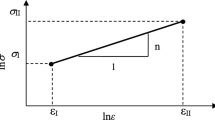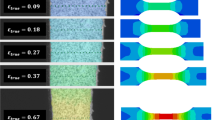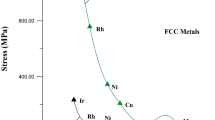Abstract
The purpose of the present article is to theoretically calculate the strain-hardening exponent and the strength coefficient of metallic materials. For this purpose, two equations are used. The first one correlates the strain-hardening exponent and the strength coefficient with the yield stress-strain behavior, while the other one correlates the fracture strength and the fracture ductility. From these two equations, the expressions of both the strain-hardening exponent and the strength coefficient are deduced. Theoretical results from the deduced expressions are then compared with test data. Through the comparison of equations and data, if adequate test data are lacking, the deduced expressions can be used to theoretically calculate the strain-hardening exponent and the strength coefficient for metallic materials. The characteristics of the theoretical approach are simple and easy to use. In addition, the theoretical results can be further applied to examine the correctness of the test data.
Similar content being viewed by others
References
X.-L. Zheng, Modeling Fatigue Crack Initiation Life, Int. J. Fatigue, 1993, 15 (6), p 461–466
X.-L. Zheng, On Some Basic Problems of Fatigue Research in Engineering, Int. J. Fatigue, 2001, 23, p 751–766
X. Zheng, A Further Study on Fatigue Crack Initiation Life: Mechanics Model for Fatigue Initiation, Int. J. Fatigue, 1986, 8 (1), p 17–21
X. Zheng, Quantitative Theory of Metal Fatigue, Northwestern Polytechnic University, Xi’an, China, 1994, in Chinese
M. Zheng, E. Niemi, and X. Zheng, An Energetic Approach to Predict Fatigue Crack Initiation Life of Ly12cz Aluminum and 16 Mn Steel, Theor. Appl. Fract. Mech., 1997, 26, p 23–28
X. Zheng, On a Unified Model for Predicting Notch Strength and Fracture Toughness of Metals, Eng. Fract. Mech., 1989, 33 (5), p 685–695
H.J. Kleemoia and M.A. Niemine, Metall. Trans., 1974, 5, p 1863–1866
Z. Zhang, W. Wu, D. Cheng, Q. Sun, and W. Zhao, New Formula Relating the Yield Stress-Strain with the Strength Coefficient and the Strain-Hardening Exponent, J. Mater. Eng. Perf., 2004, 13 (4), p 509–512
Z. Zhang, Q. Sun, C. Li, and W. Zhao, Formula Relating the Fracture Strength and the Fracture Ductility, J. Mater. Eng. Perf., submitted
Science and Technology Committee of Aeronautic Engineering Department, Handbook of Strain Fatigue Analysis, Science Publishing House, Beijing, China, 1987, in Chinese
T. Endo, and J.O. Dean Morrow, Cyclic Stress-Strain and Fatigue Behavior of Representative Aircraft Metals, J. Mater., 1969, 4 (1), p 159–175
L.E. Tucker, R.W. Landgraf, and W.R. Brose, “Technical Report on Fatigue Properties,” SAE, J1099, 1979
Author information
Authors and Affiliations
Rights and permissions
About this article
Cite this article
Zhang, Z., Zhao, W., Sun, Q. et al. Theoretical calculation of the strain-hardening exponent and the strength coefficient of metallic materials. J. of Materi Eng and Perform 15, 19–22 (2006). https://doi.org/10.1361/10599490524057
Received:
Revised:
Issue Date:
DOI: https://doi.org/10.1361/10599490524057




